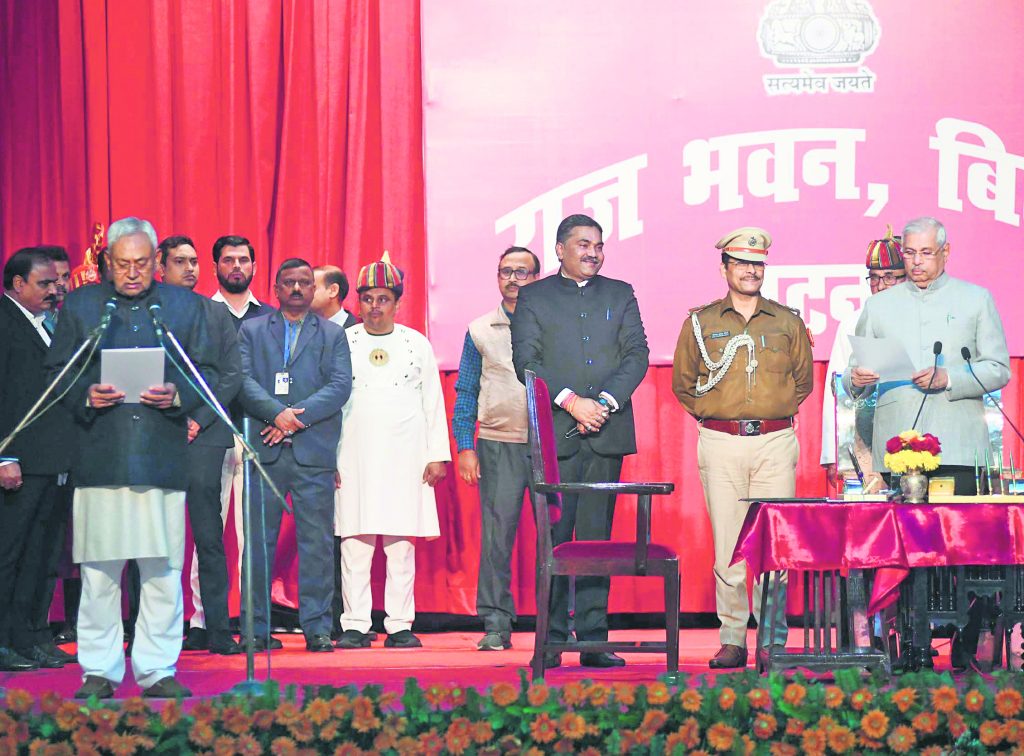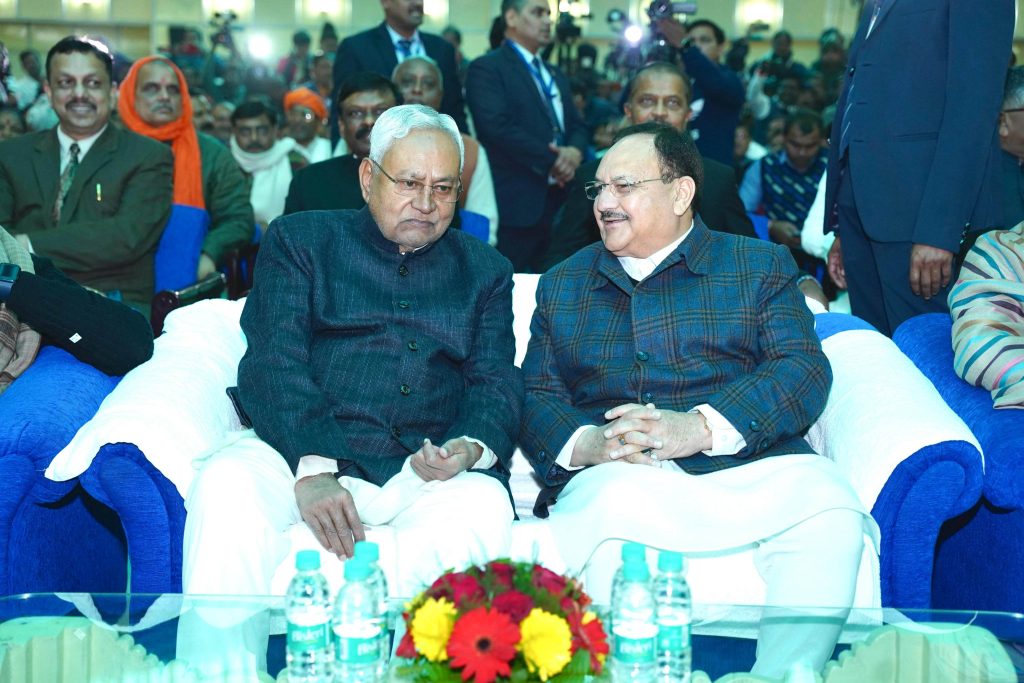The ‘Paltu Ram’ of Bihar politics has done it again. With the Lok Sabha election round the corner, the 72-year-old longest-serving Bihar chief minister Nitish Kumar has resigned as the CM of ‘Maha Gathbandhan’ government while switching sides with the BJP. A report by Aayush Goel

From being the ‘king’ in Bihar politics to ‘kingmaker’ in central government, Nitish Kumar with his latest and fourth somersault has epitomised the adage: ‘if you can’t beat them, join them’. There are no permanent friends or foes in politics. If one person has imbibed that to the core, it is Nitish Kumar. The ‘Paltu Ram’ of Bihar has done it again. On the eve of the forthcoming Lok Sabha election, the 72-year-old longest-serving Bihar chief minister Nitish Kumar has resigned as the CM of ‘Maha Gathbandhan’ government and has switched sides with BJP.
The political drama reached its peak as he was sworn as CM for the ninth time, hours after resignation, but this time holding BJP’s and HAM’s hands.
The state BJP unit elected Samrat Choudhary and Vijay Kumar Sinha as his deputy CMs. The move is an admission that the Narendra Modi-led BJP is set to return to power for a record third time. As of today, the BJP has 78 MLAs, and with JDU’s 45, Jitan Ram Manjhi’s HAM (Hindustani Awam Morcha) 4, they together have 127, five more than the required number to form the government. In the opposition camp, the RJD has 79 MLAs, Congress 19, and three Left parties have 16. One independent candidate is also backing the opposition, taking the total number to 116. The AIMIM, which has one MLA, is neither supporting the government nor the opposition.

The switch has not just hit the state coalition of Lalu Prasad Yadav-led RJD (Rashtriya Janata Dal) and Congress but appears to have dealt a severe blow to the I.N.D.I.A block and the idea of united opposition. Over the years, Nitish Kumar managed to survive as chief minister, irrespective of the party he partnered with. Lauded by some for commendable political survival skills and ridiculed by others for being the poster boy of turn coats, it’s not easy being him, say close associates. While JDU being a smaller player with just 45 MLAs, it may be noted that Nitish is also a Kurmi, a caste that accounts for just 2.87% of Bihar’s population, contrasting 14.26% of Yadavs, the core vote base of Lalu Yadav and Tejashwi’s RJD. A follower of recently Bharat Ratna awardee socialist leader Karpoori Thakur, Nitish has now emerged as the leader of the Extremely Backward Classes (EBCs), which constitutes over 30% of Bihar’s population which makes him the CM choice, irrespective of caste and seat arithmetic.
All was not well: Nitish Kumar
Shortly after submitting his resignation to the Governor of state, outgoing Bihar CM and JDU president Nitish Kumar interacted with the media. Shedding light on the cause that led to his move, Nitish said, “…this situation came because everything was not going well…I was taking opinion from everyone. I listened to all of them. Today I have resigned and ended the government…” He particularly mentioned that the alliance with the INDIA Bloc didn’t work well leading to his resignation. After Nitish Kumar handed over his resignation to the governor, he took questions from the reporters outside the Raj Bhavan. When questioned about him being accused of practicing ‘opportunistic politics’, Kumar hit out at the INDIA bloc, saying he was ‘hurt’ by the member parties. “I wasn’t saying anything for a while now. You must remember I was wanting to say a lot of things lately but did not speak. I was doing so much of work. I also formed an alliance there (INDIA bloc), and did a lot of things for it. But the others were not working at all. I was hurt because of that. People in the party were also hurt by the behaviour. Humne Chhod Diya (We have left it)” he added.
The development has changed the dynamics of the INDIA bloc as Mamta Banerjee would now look to flex muscle and try to replace Nitish Kumar as face of the bloc. West Bengal CM is scheduled to visit North Bengal while Rahul Gandhi would be around for his ‘Bharat Jodo Nyay Yatra’. She is expected to renegotiate her political stand in the bloc. The bloc is now also pinning the hope on Samajwadi Party which has come forward offering 11 of their stronghold seats to Congress in Uttar Pradesh.
Nitish’s shrinking political space
Over the past few weeks, reports from Bihar had suggested that Nitish Kumar was battling for political space. A large section in his party wanted Kumar to renew the party’s partnership with the BJP as it was convinced that the opposition coalition would not succeed in unseating the present dispensation at the Centre. Contrary to their earlier belief, Narendra Modi’s popularity is yet to be dented even after ten years in office. On the other hand, his image had had got further fillip after the recent consecration ceremony of the Ram Temple at Ayodhya, making him an invincible adversary.
Political experts claim ‘predatory’ BJP was making moves to poach a number of JDU legislators. Nitish Kumar’s relations with the RJD were strained and getting worse with each passing day. The two allies had lately been constantly sniping at each other.
While RJD’s Tejashwi Yadav felt he was not getting his due as deputy chief minister, Nitish Kumar suspected that his ally was planning to split his party and anoint Tejashwi as chief minister. It was precisely for this reason that Nitish Kumar moved in quickly to take over the presidency of his party from the incumbent Lalan Singh. It had become well-known in Patna that Singh had become close to RJD leader Lalu Prasad Yadav and that there was a distinct possibility that he could help him in spiriting away a section of his party MLAs.
Disillusionment and marginalisation in INDIA block.
While the political scene back home was not rosy, what according to Nitish loyalists drove him to finally make the switch was the disillusionment with the functioning of the 28-party I.ND.I.A block. Speaking to Tehleka, a close aid of Nitish Kumar said he felt particularly slighted at being marginalized since he had taken the initiative in bringing the disparate opposition parties together last year. Having been welcomed back by the RJD and Congress with all the hype after he dumped the BJP in 2022, Nitish Kumar wanted an upgrade and a role befitting his stature. Having caught national attention for projecting himself as face of I.N.D.I.A block and prime ministerial candidate, his ambitions however fizzled when West Bengal CM Mamata Banerjee and her Delhi counterpart Arvind Kejriwal upstaged him by suggesting that Congress president Mallikarjun Kharge be named as the INDIA bloc’s Prime Ministerial candidate. Meanwhile his numerically-stronger alliance partner in the state RJD was becoming increasingly assertive. Facing the prospect of a split in his party and, at the same time, losing out on a pre-eminent position in the opposition coalition, Nitish Kumar preferred to exit the INDIA bloc before the ‘ship sank’.
Nitish a chameleon Nitish’s exit was right on schedule just a day before Rahul Gandhi’s ambitious ‘Bharat Jodo Nyay Yatra’ was to enter Bihar. His sudden political move is highly attributed to the Congress’s failure to unite the regional parties on the seat-sharing arrangement and diverting focus majorly on Rahul Gandhi and his ‘Nyay Yatra’. Reports suggested that the JDU chief remained ‘non-committal’ about his participation in Congress’s yatra as he was reportedly upset over delay in seat-sharing talks for the 2024 Lok Sabha election. Lashing out at Kumar, Congress leader Jairam Ramesh said, “Nitish Kumar, who frequently changes political partners, is giving tough competition to the chameleons in changing colours,” Ramesh said in a post in Hindi on X. The Congress leader said the people of Bihar will not forgive the “expert of this betrayal” and those who made them dance on their tunes. Nitish had first severed his ties with the BJP in 2013 as he was unhappy that the BJP had named Narendra Modi as its Prime Ministerial candidate. The two teamed up again in the 2019 Lok Sabha election, only to part ways in 2022 as Nitish Kumar felt the BJP was constantly undermining him.












